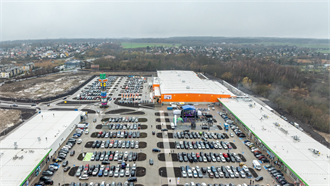Cushman & Wakefield’s lead international partner EMEA Logistics and Industrial, Rob Hall, shares his takes on the past few weeks.
‘Rarely has the importance of manufacturing and the supply chain been more acknowledged for its critical role, not only within the global economy but also in keeping households functioning with as much “new normality” as possible.
The industry has stepped up to the task with a wide range of initiatives such as the sharing of labour between companies on distribution parks and the sharing of critical infrastructure such as trucks and trailers.
A number of companies are changing their production lines set up for producing cars and engines to producing badly needed health equipment. Others are streamlining their food production to triple the output of our most demanded staple foods.
Whilst inevitably some sectors such as automotive, aviation/aerospace and bricks and mortar retail have undoubtably suffered, there has been a surge in the criticality and short-term demand for property from the grocery, eCommerce, household goods, electronics and pharma sectors. A number of grocery retailers have also reoccupied their own previously vacated space.
The reinstatement of borders between EU member states intended to prevent the spread of the virus, has restricted cross-border movement of goods. Pan-European and regional distribution centres are currently limited in their geographic reach, putting more emphasis on national and local distribution.
Rent restructures
At this stage of the crisis, reliable data is a scarcity but shared experience is accumulating and invaluable. The main story over the past few weeks has encompassed rental payments. Landlords have mobilised their assessment of rental risk within their portfolios, and the range of rent received in the sector broadly ranges widely between 50 – 75%. Many tenants are approaching their landlords for rental deferment, typically at this stage for 3 months.
Two major REITS have reported that approximately 25% of their gross rent roll have approached them for rent restructuring. Most landlords are dealing with the requests on a merited case by case basis. There have been ranges of acceptance of rental deferment typically, but not exclusively, of extending the leases by the equivalent period or the amortising of the deferred sum over a period of say 12-24 months.
In the meantime, occupational clients have been focused on retaining the operational integrity of their businesses and how their real estate and FM functions can fully support this. The deep cleaning of properties has become a priority as has the provision of hygiene equipment for the workforce.
Support in socially distanced times
Social distancing has been a critical focus, and how health and safety in a warehouse environment can be retained in businesses which are critical to maintaining the supply chain of critical services. We are taking our sixfootoffice concept into the sixfootwarehouse to work with clients on how we can help them ensure the required distancing in an operational environment.
The design concept consists of elements that include a visually displayed unique foot traffic routing and one-way systems for buildings to ensure employees maintain the recommended six feet apart for social distancing.
Additional features include tangible products like clear shields between workstations and a set of simple and workable agreements and rules of conduct that place employee health and safety at the forefront of warehouse culture. Other matters include staggered work shifts, reconfiguring common areas, implementing worker temperature checks, design concepts for workflows within the operation and in the longer term looking at the use of enhanced automation and technology.
Thriving sub-sectors
Whilst a significant number of transactions have inevitably been put on hold and budgeted occupational capex has been deferred until 2021, we have seen a number of sub sectors thriving. As may be expected grocery, online retail and pharma have been trading very well and in some cases have sought short term expansion space. We have also witnessed evidence of companies’ extra capacity for storing goods and containers as they arrive from ocean going freight journeys from Asia.
With reduced throughput on retail or manufacturing there is the need to stockpile product as open storage or in secure warehousing in the short to medium term. Building construction has in the main, but not entirely halted. Additionally, we have seen collaboration between noncompeting companies in terms of supporting each other on deliveries, trucks and shared resource.
There are also challenges with workforce absenteeism as a result of covid-19. We have spoken to companies who are seeing absenteeism of about 15% within the key worker workforce which in itself is causing challenges which have adversely impacted on the efficiencies within the supply chain.
Looking to the future
Looking forward there are a number of areas we would anticipate unfolding. There is a possibility that supply chains may in some cases retract from finely tuned just in time deliveries to allow more robustness to the supply chain and a consequential uptick on the warehouse space required. Prologis have estimated that this may see an increase of 5-10% of inventory storage moving forward. There may in the medium term be an acceleration of reshoring in manufacturing where possible and a consequential shortening of supply chains.
Additionally, the sector may look at the workplace environment within their office functions, both integrated within the warehouse and also at a regional HQ level. Design moving forward may look at how the workplace is configured and how hygiene factors and air conditioning systems can be effectively maintained and filtered.
Logistics and Industrial has proved itself to be critical in the current crisis. Our clients and their employees have been at the forefront of manufacturing critical medical components, delivering and selling the household produce required to support our daily life, health and welfare. The real estate component supporting this has played its role and the adaptability of the logistics and industrial occupiers and landlords has provided the platform.'


































